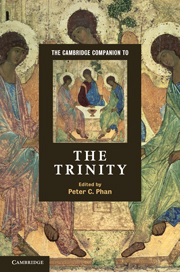Book contents
- Frontmatter
- Contents
- Notes on contributors
- Preface
- Part I Introduction
- Part II Retrieving the sources
- Part III Renewing the tradition
- Part IV Contemporary theologians
- 10 Karl Barth, reconciliation, and the Triune God
- 11 Mystery of grace and salvation: Karl Rahner's theology of the Trinity
- 12 Hans Urs von Balthasar on the Trinity
- 13 The trinitarian doctrines of Jürgen Moltmann and Wolfhart Pannenberg in the context of contemporary discussion
- 14 Sophia, apophasis, and communion: the Trinity in contemporary Orthodox theology
- 15 The life-giving reality of God from black, Latin American, and US Hispanic theological perspectives
- 16 Feminist theologies and the Trinity
- Part V In dialogue with other religions
- Part VI Systematic connections
- Index
- References
16 - Feminist theologies and the Trinity
from Part IV - Contemporary theologians
Published online by Cambridge University Press: 28 July 2011
- Frontmatter
- Contents
- Notes on contributors
- Preface
- Part I Introduction
- Part II Retrieving the sources
- Part III Renewing the tradition
- Part IV Contemporary theologians
- 10 Karl Barth, reconciliation, and the Triune God
- 11 Mystery of grace and salvation: Karl Rahner's theology of the Trinity
- 12 Hans Urs von Balthasar on the Trinity
- 13 The trinitarian doctrines of Jürgen Moltmann and Wolfhart Pannenberg in the context of contemporary discussion
- 14 Sophia, apophasis, and communion: the Trinity in contemporary Orthodox theology
- 15 The life-giving reality of God from black, Latin American, and US Hispanic theological perspectives
- 16 Feminist theologies and the Trinity
- Part V In dialogue with other religions
- Part VI Systematic connections
- Index
- References
Summary
The title of James Alison's publication Undergoing God: Dispatches from the Scene of a Break-in provides one way of thinking about the significance of feminist theologies within the recent widespread revival of the doctrine of the Trinity. The image of a “break-in” communicates something of the disruptive and unexpected. At times the effects of a break-in are immediate and obvious, at other times they are only discovered gradually. A break-in can also cause dismay and anger, which need to be dealt with as quickly as possible so that life can proceed as before. However, in terms of the spiritual life, a break-in has a positive connotation: an in-breaking of the Spirit heralds conversion and transformation. The systematic theologian Anne Carr uses the term “transforming grace” to describe the gift of feminist theology to the church. It is in this sense that I will use “break-in” in this chapter.
In order to explore the contribution of feminist theologies to the evolving reception of the mystery of God as Trinity, I have taken account of the work of feminist theologians from various cultures and perspectives, including womanist, mujerista, and Asian theologians, and then examined the mosaic that came to light. To communicate the essential elements of the patterns that emerged, I will use Alison's evocative image and describe dispatches from five scenes of a feminist break-in on trinitarian discourse. These dispatches will use the theologians' own voices as directly as possible. I will then summarize the various strands of the collective picture.
- Type
- Chapter
- Information
- The Cambridge Companion to the Trinity , pp. 274 - 290Publisher: Cambridge University PressPrint publication year: 2011



